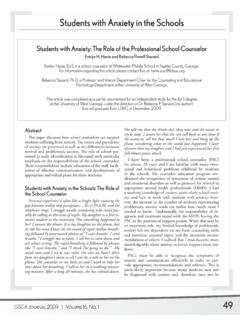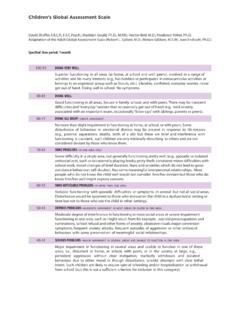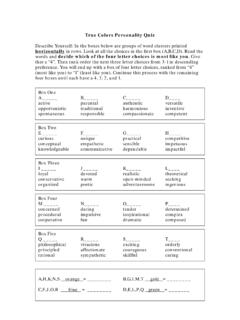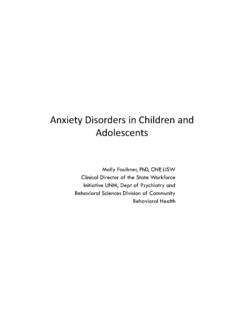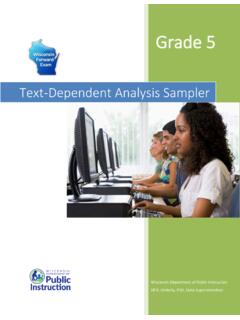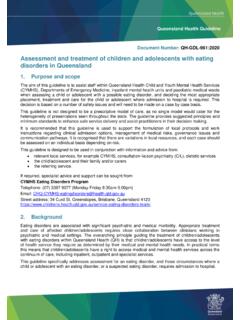Transcription of Promoting Emotional Resilience - Support & Advice
1 Promoting Emotional Resilience Helping children to find ways to function in a world where bad things happen A Resource Pack Acknowledgements The contents of this resource pack have been developed and edited by the West Sussex CAMHS and school Attendance Project. Much of the material has been useful to our own practice with children, young people and their parents and carers. Other items have been recommended by our colleagues in CAMHS and education. We would like to pass on our sincere thanks to those who have suggested resources and who have also given feedback on the content and layout as our work has progressed.
2 Every effort has been made to credit material to the original author whenever possible. Copyright 2008 West Sussex County Council Permission granted to reproduce for personal and educational use only. Commercial copying, hiring, lending is prohibited. May be used free of charge. Selling without prior written consent prohibited. Obtain permission before redistributing. Original sources must be credited. In all cases this notice must remain intact. Foreword West Sussex County Council and the Sussex Partnership NHS Trust are committed to Promoting children s mental health and Emotional well-being.
3 Mental health is about maintaining a good level of personal and social functioning. For children and young people, this means getting on with others, both peers and adults, participating in educative and other social activities and having positive self-esteem. 1 In West Sussex there is increased recognition of the importance of Promoting all children s Emotional well-being and the benefits of working together to promote this. This Resilience tool kit provides a useful resource for child welfare professionals, schools and others who are striving to ensure positive outcomes for children and young people.
4 Mark Greening Manager of the CAMHS and school Attendance Project. 1 Promoting Children s Mental Health within Early Years and school Settings, Department for Education and Skills, 2001. Introduction What is Resilience ? It is a phenomena that enables children and young people to survive and function despite disadvantage and risk beyond that of the normal challenges of growing up. Masten describes Resilience as ordinary magic .2 Evidence has shown that it is possible to identify the factors that have an impact on children s Emotional health.
5 Risks can be specific to the child, their family, their environment (including school ) and life events: Loss or separation resulting from death, parental separation, divorce, hospitalisation, loss of friendships especially in adolescence, family breakdown which results in the child having to live elsewhere; Life changes, birth of a sibling, moving house, changing schools; and Traumatic events abuse, violence, accidents, injuries, war or natural disaster. Some children, against all the odds, develop into confident, competent and caring adults.
6 A key therefore to the promotion and recovery of children s mental health is an understanding of the protective factors that make children resilient. Resilience factors Resilience does not constitute an individual trait or Resilience involves a range of processes that bring together quite diverse mechanisms 3 There is a complex interplay between risk factors in children s lives and Promoting their Resilience . As disadvantage and stressful events accumulate for a child, then more protective or resilient factors are needed as a counterbalance.
7 Resilience factors in the child: Secure early relationships (attachment) Being female Higher intelligence Easy temperament when an infant Positive attitude, problem-solving approach Good communication skills Planner, belief in control Humour Religious faith Capacity to reflect 2 Ordinary magic: Resilience processes in development. Masten 2001. American Psychologist, 56(3), 227-238. 3 Rutter, 1995. Cited in Resilient Therapy, Hart, Blincow and Thomas, Routledge 2007. Resilience factors in the family: At least one good parent-child relationship Affection Clear, firm and consistent discipline Support for education Supportive long term relationship/absence of severe discord Resilience factors in the community.
8 Wider supportive networks Good housing High standard of living High morale school with positive policies for behaviour, attitudes and anti-bullying Schools with strong academic and non-academic opportunities Range of positive sport/leisure activities Resilient processes might seek to: Reduce the likelihood of negative chain reactions arising from the risk Promoting self-esteem and self-efficacy through the availability of secure and supportive personal relationships, or success in achieving tasks; and Opening up new and positive opportunities and offering turning points, where a risk path may be rerouted.
9 The above processes will not be unfamiliar to anyone involved in Pupil Assessment and Review Meetings (PARM), Team Around the Child (TAC) meetings, core-group planning or indeed any other forum concerned with the welfare of children and young people. The promotion of Resilience is not a new concept and there is an ever growing wealth of research, books and material on the subject. This toolkit represents the CAMHS and school Attendance projects attempt to compile and edit some of the material we have found useful and effective in our practice.
10 We hope you find it a useful contribution to your work with children and young people. How to Use This Pack This pack has been designed primarily to be used by professionals. The majority of the content however can also be useful shared with parents and carers. It is divided into two main areas, articles and background reading, and activities to use with young people. The articles have been collected from various sources, and provide an introduction to some of the ideas and theories that Support the idea of Promoting Resilience . The further reading and book reviews at the back of the pack provide further information, and are books we use in our practice.
